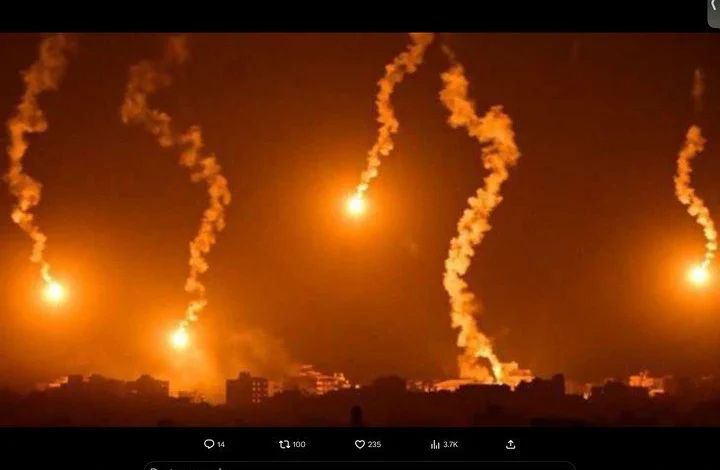
The War Cabinet unanimously decided that Israel would continue the operation in Rafah to apply military pressure on Hamas to promote the release of our hostages and achieve the other objectives of the war,” read a statement from the office of PM Benjamin Netanyahu.
“At the same time, although Hamas’s proposal is far from Israel’s requirements, Israel will send a delegation of mediators to exhaust the possibility of reaching an agreement under terms acceptable to Israel.”
Senior Israeli officials claimed to Ynet on Monday night that “the Egyptian-Qatari cease-fire proposal accepted by Hamas had no input from Israel and was not acceptable.”
The officials called it “an exercise and a unilateral proposal without Israeli involvement.”
An Israeli official speaking on condition of anonymity told the Telegraph: “Hamas’s acceptance of an Egyptian-Qatari peace deal is a “ruse” designed to make Israel look like it is obstructing peace.”
Earlier in the evening, Ismail Haniyeh, the head of the Political Bureau of Hamas informed in phone calls to the Head of the Egyptian General Intelligence Service Abbas Kamel and Qatar Prime Minister Mohammed bin Abdulrahman Al Thani that the movement has accepted their proposal for a ceasefire in the Gaza war.
On Monday morning, Israel ordered the evacuation of civilians from eastern Rafah before carpet bombing whole residential blocks in the area ahead of an imminent ground invasion of the southernmost city in the strip where 1.5 million residents and displaced Palestinians have been sheltering from Israeli bombing since 7 October.
The evacuation and bombing sent thousands of panicked Palestinians fleeing for their lives out of eastern Rafah.
Shortly after the Israeli army spokesperson announced the start of the tank attack on Rafah, Secretary-General of the Arab League Ahmed Aboul-Gheit said: “Israel’s manoeuvres despite Hamas acceptance of the Egyptian-Qatari ceasefire offer indicate its ill intentions.”
“I call on the Security Council, especially the United States and Western countries supporting Israel, to bear their responsibilities and restrain the occupation forces to prevent further escalation as it is the Palestinian civilians who pay the price,” Aboul-Gheit wrote on his X account.
Earlier in the day, the Egyptian Ministry of Foreign Affairs on Monday warned of the dangers of a possible Israeli military operation in the Palestinian Rafah area in the south of the Gaza Strip.
The foreign ministry said any such military operation would pose significant humanitarian risks and threaten more than a million Palestinians in that area.
Egypt called on Israel to exercise the utmost restraint and avoid further escalation at this sensitive time during ceasefire negotiations, and to stop the shedding of Palestinian civilian blood who have been facing an unprecedented humanitarian disaster since the start of the Israeli war on the Gaza Strip.
The statement reaffirmed Egypt’s continued communication around the clock with all parties to prevent the situation from worsening or spiralling out of control.
Terms of a deal
On Monday evening, shortly before the start of the Israeli tank movement into Rafah, Khalil Al-Hayya, deputy head of the Hamas Political Bureau, revealed to Al Jazeera details of the ceasefire deal proposed by Egypt and Qatar and accepted by the movement.
The proposal presented to us by Egyptian and Qatari mediators includes three stages each stage lasting 42 days, Al-Hayya, who is based in Doha, explained to Al Jazeera.
Al-Hayya said the text of the ceasefire proposal includes the interconnectedness of the three stages of implementation.
The mediators told us that the US President has committed clearly to guaranteeing the agreement’s implementation.
Shortly after Haniyeh’s announcement, US State Department Spokesperson Matthew Miller confirmed that the US has received a response from Hamas on ceasefire-for-hostages in Gaza and will be reviewing that response with its partners Egypt and Qatar and discussing it with Israel.
Miller said a deal is in the best interests of Israel, securing the release of hostages and ensuring more humanitarian aid flows into Gaza.
President Abdel-Fattah El-Sisi stated on Monday evening that he “closely monitors” the positive developments in the ongoing Israel-Hamas negotiations, brokered by Cairo and Doha, calling on all parties to exert more effort to reach an agreement.
“I closely monitor the positive developments in the current negotiations to reach a comprehensive ceasefire in the Gaza Strip. I call on all parties to exert more effort to reach an agreement that will end the humanitarian tragedy suffered by the Palestinian people and complete the exchange of hostages and prisoners,” El-Sisi wrote on his official Facebook page.
Egyptian-Qatari truce efforts
Security officials from Egypt, Qatar and the US have been mediating to reach a ceasefire between Hamas and Israel to end the seven-month-old Israeli war on Gaza.
The last round of negotiations was held in Cairo over the weekend.
On Sunday, the Hamas delegation left the Egyptian capital to consult with the leadership in Doha on the most recent proposals for a truce deal.
Earlier today, Al-Qahera News reported that the Hamas delegation was set to return to Cairo for talks on Tuesday.
International alarm
EU foreign policy chief Josep Borrell on Monday said Israel’s evacuation order for Palestinians in Rafah is “unacceptable” as France said “the forced displacement of a civilian population constitutes a war crime.”
“Israel’s evacuation orders to civilians in Rafah portend the worst: more war and famine. It is unacceptable. Israel must renounce to a ground offensive,” Borrell said, calling on Israel to “implement UN Security Council Resolution 2728,” which demanded an immediate ceasefire in Israel’s war on Gaza during Ramadan.
“The EU, with the International Community, can and must act to prevent such scenario,” he added in the post on X (formerly Twitter).
Meanwhile, Germany on Monday called on all parties to continue with negotiations towards a truce in Gaza shortly after Israel issued evacuation orders to Palestinians in eastern Rafah.
“The negotiations must not be jeopardised and all sides must make maximum efforts to ensure that the people in Gaza are supplied with humanitarian goods… and that the hostages are freed,” a foreign ministry spokeswoman told a government press briefing.
German Foreign Minister Annalena Baerbock on Monday said Germany has been doing “everything we can for months to finally alleviate the immeasurable suffering of the people in Gaza”.
France said it was “strongly opposed” to Israel’s Rafah offensive, ahead of an expected ground assault in the southern city of the Gaza Strip.
“France reiterates that it is strongly opposed to an Israeli offensive on Rafah, where more than 1.3 million people are taking refuge in a situation of great distress,” the foreign ministry said in a statement.
“The forced displacement of a civilian population constitutes a war crime.”
Earlier in the day, the Israeli army said it ordered the evacuation of 100,000 people from eastern Rafah, ahead of an expected ground assault in the southern city of Gaza.
About 1.2 million people are currently sheltering in Rafah, according to the World Health Organization, most having fled there from elsewhere in Gaza during the seven-month Israeli war on the strip.
Various world capitals and international organizations have warned that an assault on the densely populated city would have catastrophic consequences for a civilian population on the verge of starvation.
UNICEF: No where for children to go!
There is ‘nowhere safe to go’ for the 600,000 children of Rafah, warned UNICEF in a statement on Monday shortly after the Israeli evacuation order for eastern Rafah was issued.
“With hundreds of thousands of children in Rafah injured, sick, malnourished, traumatized or living with a disability, UNICEF calls for children to not be forcibly relocated, and the vital infrastructure on which children rely to be protected.”
With the unfolding humanitarian crisis in the Gaza Strip continuing to deteriorate, UNICEF is warning that a military besiegement and ground incursion in Rafah would pose catastrophic risks to the 600,000 children currently taking shelter in the enclave.
Following October evacuation orders to move to the south, it is estimated that there are now about 1.2 million people sheltering in Rafah, once home to about 250,000 people. As a result, Rafah (20,000 people per km2) is almost twice as densely populated as New York City (11,300 people per km2), and about half the population is children, many of whom have been displaced multiple times and are sheltering in tents or informal and unstable housing.
Given the high concentration of children in Rafah – including many who are highly vulnerable and at the edge of survival – as well as the likely intensity of the violence, with potential evacuation corridors likely mined or littered with unexploded ordnance; and shelter and services in areas for relocation very likely to be limited – UNICEF is warning of a further catastrophe for children, with military operations resulting in very high civilian casualties and the few remaining basic services and infrastructure they need to survive being totally destroyed.
“More than 200 days of war have taken an unimaginable toll on the lives of children,” said Catherine Russell, UNICEF Executive Director. “Rafah is now a city of children, who have nowhere safe to go in Gaza. If a large scale military operations start, not only will children be at risk from the violence, but also from chaos and panic, and at a time where their physical and mental states are already weakened.”




